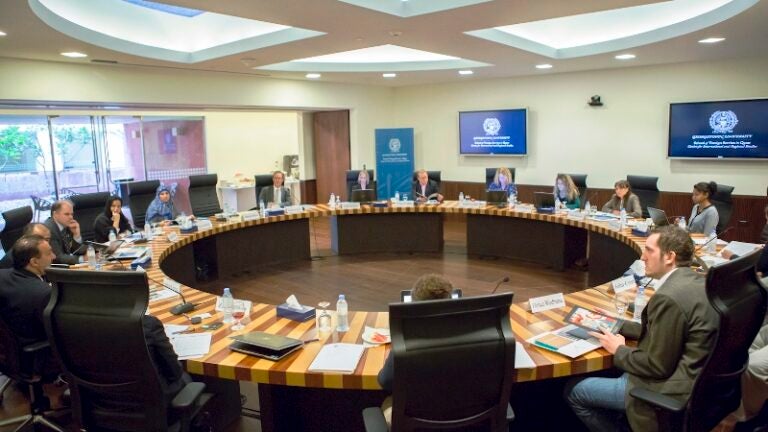Russia’s Invasion of Ukraine: Assessments, Implications, Prospects - Roundtable Discussion

On October 25, 2024, the Center for International and Regional Studies at Georgetown University in Qatar hosted a closed-door roundtable discussion to examine the Russian invasion of Ukraine and discuss how it has not only reshaped the geopolitical landscape in Europe but also the repercussions it has had across many regions. The event brought together experts from multiple disciplines to analyze the ongoing situation and its global implications and tried to lay the groundwork for future discussions and partnerships aimed at addressing complex geopolitical challenges. The discussion was structured around three fundamental questions: the war’s impact on Western powers (both direct and indirect), its implications for non-Western players, and the most practical endgame scenarios.
The discussion was divided into three sessions with the first session looking at the Impact of Three Years of Conflict on Key Players and Alliances. During the conversation it was highlighted that the conflict has led to a reevaluation of strategic partnerships, debunking the myth of Russia as an anti-colonialist ally. There is growing recognition of Chinese undercurrents and its gains from the situation, alongside evolving mediation efforts. Prior to 2022, mediation centered around US-EU dynamics, but the Middle Eastern nations have shown success in targeted mediation efforts post-2022. the increased threats to European security were also highlighted, with an alarming number of Europeans still conflating Ukraine with Russia. The need for clear strategic objectives was stressed, recognizing that neutrality would not resolve current challenges. Significant internal changes were observed in Russia, leading to a more consolidated regime that has become resilient against external pressures. Bureaucratic replacements have strengthened the central authority over traditional elites. Discussion included the historical trajectory of US-Ukraine relations, transitioning from minimal involvement to recognizing the conflict as a vital concern. Despite Russia’s framing of its actions as resistance to American interests, the US continues to focus strategically on its competition with China. Complexities involving territorial and security concerns complicate potential resolutions. Participants explored the roles of nuclear deterrence, sanctions, and engagement with the Global South, emphasizing varied international mediation strategies. The need to understand historical contexts in planning future security arrangements was reiterated, alongside discussions of required victory conditions and implications for global order.
The second session, Assessing the War’s Impact on Global South International Relations, addressed the perspectives from various regions, including the Middle East, Central Asia, and China. The decline of Western influence was acknowledged, with China strategically moving to fill vacuums left in global governance. It aims to cease hostilities without direct involvement, despite its EU trade relations. Central Asian countries are balancing relations while heavily dependent on Russian infrastructure, leading to an identity crisis among youth. For example, nations like Kazakhstan have expressed support for Ukraine while dealing with economic ties with Russia. Arab nations approach the conflict cautiously, weighing the risks and opportunities it presents while maintaining diplomatic relations with the US. Their responses vary across international forums, influenced by potential food security and oil trade implications. Iran’s foreign policy reflects a “look East” strategy, emphasizing strong neighborly relations and resilience against Western sanctions. Its complex relationship with Russia is economic and strategic, favoring independence in its foreign relations.
The last session, End Game Scenarios, tried to bring the conversations from the first two panels together and examine potential ways forward to end the conflict. It was discussed that the future trajectory of the war remains contingent on various factors, with both Russia and Ukraine committed to continuing the conflict. Analysts presented three main policy options for external powers: facilitate a peace settlement favoring Ukraine, achieve a cessation of hostilities, or continue supporting Ukraine indefinitely. Each choice carries significant risks, particularly regarding potential escalation or instability in Ukraine. Western powers are urged to pursue the first option, aligning closely with Ukrainian objectives while ensuring robust military and economic support. The discussion highlighted the potential for a long-term stalemate, with time not favoring Ukraine. The US’s engagement and coherence in strategy are deemed critical for Ukraine’s eventual success, with calls for a reinvigorated assessment of NATO’s posture against Russian threats. It was highligthed that the current dynamics could lead to a prolonged conflict, with Russia’s perceived victories potentially becoming a strategic liability for the West. The need for a decisive shift in international strategies toward Russia was emphasized, highlighting the crucial upcoming years in determining the global order and European security landscape.
In conclusion, these sessions collectively showcased the multifaceted nature of the conflict and its broad geopolitical ramifications, illustrating the complexities faced by global powers and regional actors involved.
Article written by Misba Bhatti, Research Analyst, CIRS